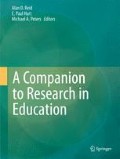Abstract
Ramaekers provides a strong argument to go beyond a ‘what works’ approach, pointing out that for educational research to be truly educational, a more engaged commitment to truth is essential. In this piece, I explore how we might conceive the truth of educational research in relation to our agreement in judgements, and thus, the implications of this work in helping transform our sense of responsiveness and responsibility as writers and readers of educational research. Elaborating on the conceptualisation of truth in terms of agreement in judgements, it is argued that educational research is constitutive rather than descriptive. Educational research redefined along these lines does not appear as a representation of reality, but as a cultural moment. Its task is to actively endow reality with meaning, stimulating its reader to become engaged in a discussion of what is worth pursuing, instigated by what the researcher provides. As such, educational research contributes to the permanent adaptation and transformation of our culture to the new demands of the present.
Access this chapter
Tax calculation will be finalised at checkout
Purchases are for personal use only
Notes
- 1.
Ramaekers uses this account as an example to illustrate the Wittgensteinian account of truth as being a matter of agreement in judgements.
- 2.
I draw here on the work of Hayden White (e.g. 1988), who develops these thoughts in the context of Historiography.
- 3.
As respectively conceptualised by Wittgenstein, Cavell and Gaita.
- 4.
I am drawing here on the work of Roland Barthes (1981).
- 5.
I draw on the work of Stanley Fish (1980) here, who elaborates on the grounds of interpretive acceptability.
- 6.
I would like to thank Paul Smeyers and Nancy Vansieleghem for their critical reading and useful comments.
References
Alexander H (2013) Traditions of inquiry in education: engaging the paradigms of educational research. In: Reid AD, Hart EP, Peters MA (eds) A companion to research in education. Springer, Dordrecht, pp 13–25
Altieri C (1998) Poetics as “untruth”: revising modern claims for literary truths. New Literary Hist 29(2):305–328
Armstrong N (2007) Realism before and after photography: “the fantastical form of a relation among things”. In: Beaumont M (ed) Adventures in realism. Blackwell, Malden, pp 84–102
Barthes R (1981) The discourse of history. Comp Criticism 3:7–20
Castle G (2007) The Blackwell guide to literary theory. Blackwell, Malden
Fish S (1980) Is there a text in this class? The authority of interpretive communities. Harvard University Press, Cambridge
Flyvbjerg B (2001) Making social science matter: why social inquiry fails and how it can succeed again. Cambridge University Press, Cambridge
Gaita R (2002) A common humanity: thinking about love and truth and justice. Routledge, London
Hammersley M (2004) Get real! A defense of realism. In: Piper H, Stronach I (eds) Educational research: difference and diversity. Ashgate, Aldershot, pp 59–78
Hough S (1997) Nietzsche’s noontide friend. The self as metaphorical double. The Pennsylvania State University Press, University Park
Iser W (1972) The reading process: a phenomenological approach. New Literary Hist 3(2):279–299
Jameson F (1972) The prison-house of language: a critical account of structuralism and Russian formalism. Princeton University Press, Princeton
Krieger M (2000) The “imaginary” and its enemies. New Literary Hist 31(1):129–162
Rogne E (2009) The aim of interpretation is to create perplexity in the face of the real: Hayden White in conversation with Erlend Rogne. Hist Theory 48(1):63–75
Smeyers P (2013) The design(s) of educational research: description and interpretation. In: Reid AD, Hart EP, Peters MA (eds) A companion to research in education. Springer, Dordrecht, pp 67–76
Stables A (2013) Relativism, research and social responsibility: some remarks inspired by Smeyers, Wittgenstein and Lyotard. In: Reid AD, Hart EP, Peters MA (eds) A companion to research in education. Springer, Dordrecht, pp 77–81
Stake R, Kerr D (1995) René Magritte, constructivism, and the researcher as interpreter. Educ Theory 45(1):55–61
Standish P (2002) Disciplining the profession: subjects subject to procedure. Educ Philos Theory 34(1):5–23
White H (1988) Historiography and historiophoty. Am Hist Rev 93(5):1193–1199
Author information
Authors and Affiliations
Corresponding author
Editor information
Editors and Affiliations
Rights and permissions
Copyright information
© 2014 Springer Science+Business Media Dordrecht
About this chapter
Cite this chapter
Mus, S. (2014). Providing a Space to Enable Alteration in Educational Research. In: Reid, A., Hart, E., Peters, M. (eds) A Companion to Research in Education. Springer, Dordrecht. https://doi.org/10.1007/978-94-007-6809-3_8
Download citation
DOI: https://doi.org/10.1007/978-94-007-6809-3_8
Published:
Publisher Name: Springer, Dordrecht
Print ISBN: 978-94-007-6808-6
Online ISBN: 978-94-007-6809-3
eBook Packages: Humanities, Social Sciences and LawEducation (R0)

